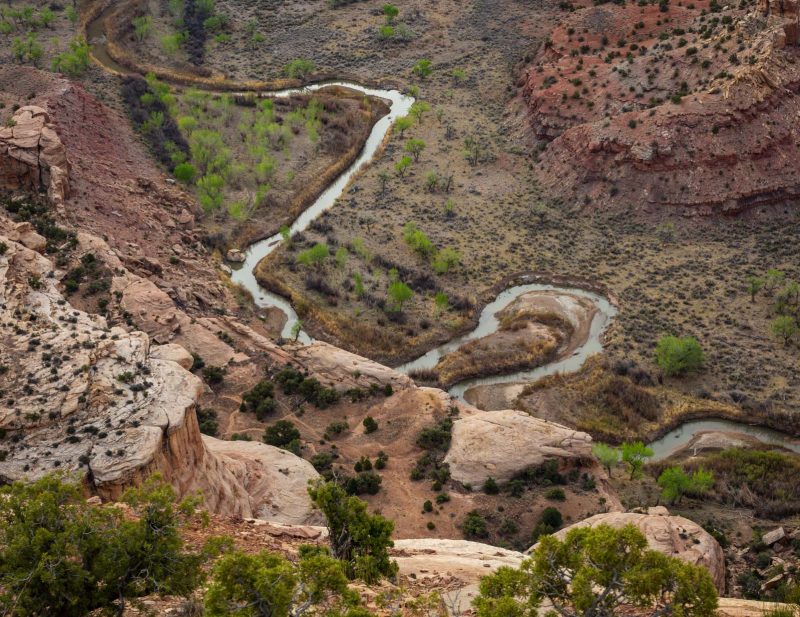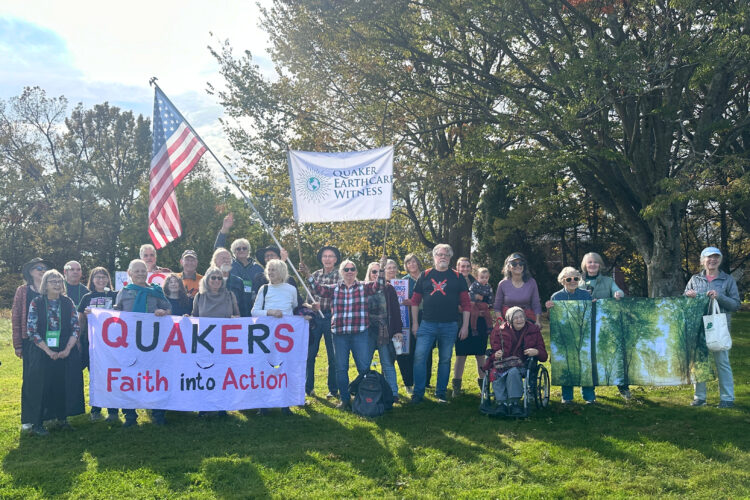Freeing Ourselves From Possessions

Image by Kathy Barnhart
Freeing Ourselves From Possessions
By Tom Small
If you want to make small changes, change the way you do things.
If you want to make major changes, change the way you see things.
–Gabe Brown, quoting Don Campbell
Burley Coulter is, to me, one of the most memorable characters in Wendell Berry’s novels and stories. What most endears him to me is his sense of the community of Port William, where most of Berry’s stories take place: “The way we are,” Burley offers, “we are members of each other. All of us. Everything.”
Berry, commenting on Burley’s “Everything,” suggests that “Burley improved on St. Paul by telling a more comprehensive truth.” Membership includes not just a faith community but “everything.” Comprehensively.
Everything? Including the river that runs through Port William? The land; creatures, domestic and wild; tobacco crops and grain crops; oak trees, wild lupine; Nathan Coulter’s house, the barns, and sheds; Jayber Crow’s barber shop; and all the numberless “things” that make mere space into a place, a “home place.” All are “members of each other”? The “all of us” membership?
Suppose we begin with trusting Burley and Wendell to mean what they say. What then are the implications of this “truth”? And how shall we extend such a truth beyond Berry’s fictional “Place in Time” and “Place on Earth” to our own places and times? Do we, most of us, actually have a “place” of the sort Burley would understand and, despite his restless nature, be at home with? A place that is our own?
It is now commonplace to refer to us non-indigenous people as “settlers.” But to Wendell Berry—and I suspect to Burley as well—we are the “unsettlers.” In his 1977 essay, “The Unsettling of America,” Berry argues that the predominant motive in America is one of unsettlement, a continual “haste and anxiety to displace ourselves,” beginning from the displacement of the Native Americans, proceeding through successive frontiers and horizons, from farmstead to city tenement and high-rise to suburban “starter home,” and onwards, an unrelenting migration of seekers for yet an other place to begin, again
As we progressed, we displaced or decimated species and entire ecosystems: buffalo, flood plains, riverbeds, wetlands, prairie dogs, grassland, bumblebees, beaver, passenger pigeons, mountain tops, forests. Over a loose network of tribal territories and commons, we superimposed a gridwork of parcel, property, and pavement. Land became a fungible commodity, a possession endlessly exchangeable for something, someplace else. In the process of taking possession, we became dispossessed—temporary occupiers of a platted, fenced-off lot in the geography of nowhere.
The rationale is always improvement: better location or “higher” land use. It is necessary, “manifest destiny,” to replace whatever is outmoded, unmanageable, provincial, inefficient, primitive, uncivilized, savage. Whatever we encounter, wild or cultivated, is subject to commodification and “improvement.”
There have always, however, been voices of protest and celebration of all that is lost in the race to improvement. The classical Arcadia of Theocritus and Virgil; Renaissance glorification of poetical goat herders in Arcadian pastoral landscape; peasant rebellions against enclosure of traditional common lands; the Romantic Movement’s idealization of wild land, rural life, and Noble Savage—these are recurring, subversive voices against “improvement.”
In the last few decades, we have begun to recognize that the rebels and resisters were on the right side. Perhaps, had they not been brutally suppressed or co-opted, we would not be systematically destroying the commons—earth, water, air, and fire.
Contemporary commoners, regenerative farmers, and indigenous peoples harken back to those earlier countercultural rebels and ancestors. What most of us still see as primitive, they see as the primal source of recovery, renewal. Traditional commoners and indigenous peoples still “belong to the land” and, like their revered ancestors, regard “things” as persons, deserving of the same respect, rights, and care as we accord to family members. Trees, entire plant communities, rivers, watersheds, ecosystems, the soil—these are alive, with their own languages and intelligence. They embody, as William Wordsworth envisions, “A motion and a spirit that impels All thinking things, all objects of all thought, And rolls through all things.” All. Burley’s “Everything.”
Persons cannot be fungible property. We cannot “own” them. We share with them, as with Burley’s “members of each other.” Past, and yet to come. Land is heritage, a gift from ancestors and all the more-than-human relations who pass among us, regardless of borders and fences. Land is usufruct, obligating future return, unharmed, respecting its integrity. A gift must be freely passed along, lest it cease being gift and become mere property.
Increasingly, we “unsettlers” begin our ceremonies and meetings by “acknowledging” natives who flourished here for thousands of years, caring for this land we now occupy—before we displaced them. Do we likewise acknowledge and honor our own ancestors, whose sweat still lingers in the soil and whose breath still mingles with ours–those whose wanderings and perseverance enabled us to be here? Do we also acknowledge all the creatures of the earth, air, and water whom we are displacing or extinguishing but who still belong to the land? The Haudenosaunee do, in their “Thanksgiving Address,” the “words which come before all else.” They also acknowledge the future, “the next seven generations.”
Do we, as William Morris asks of us, have nothing in our houses that we “do not know to be useful, or believe to be beautiful”? Are the implements and ornaments in our houses real presences, responsive to touch and imagination? Do they, like the living elements of which they partake—air, earth, fire, water, wood, space—do they breathe, each according to a personal rhythm? Familiar, yet always a little strange. Generational. Like the hand-carved African spoon I use to stir my morning tea. Like the brass handles of our kitchen cabinet doors, tarnished by the elements and brightened by our repeated touch. Like my grandmother’s heavy bronze bookends—robed figures of “Knowledge” and “Wisdom”—which still evoke, for me, the darkling bookshelves of my childhood home and their magical books that spoke, silently, of past and future. Do you hold such “things” in the light?
The Romantic visionary poet and artist William Blake saw everything in the clear light of imagination: “If the doors of perception were cleansed every thing would appear to man as it is, Infinite.” Every thing. Infinite. The great founder of The Religious Society of Friends, George Fox, asks that we “Walk cheerfully over the world, answering that of God in everyone.” Perhaps, with a little help from Burley and Wendell and Blake, we can improve upon Fox: “answering that of God in Everything.” Answering. Responding. In the Spirit. Dialogue, with all things.
George Washington Carver offers further help: “If you love it enough, any thing will talk with you.” Any thing. Every thing. Suppose we trust Carver to mean exactly what he says. Walk cheerfully through your house, your land. “Look about you,” as Carver asks of us; “Take hold of the things that are here. Let them talk to you. You learn to talk to them.” The prophets, ancient and modern, show us the way. The way of imagination. The way of love.
We cannot free ourselves of possessions. We own nothing, including ourselves. Ancestors, Indigenous peoples, seven generations yet to come, Everything—they all hold us in common, members of each other. Seek only to clear away all mere “things” which have not become responsive members of the commune—the commons of use and beauty—your infinitely extended family.
RESOURCES
- Wendell Berry, The Unsettling of America (1977).
- Liz Carlisle, Healing Grounds: Climate, Justice, and the Deep Roots of Regenerative Farming (2022).
- Jim Corbett, Goatwalking: A Guide to Wildland Living, The Quest for the Peaceable Kingdom, 2nd ed. (2023)
- Lewis Hyde, The Gift: Imagination and the Erotic Life of Property (1983).
- Peter Linebaugh, The Magna Carta Manifesto: Liberties and Commons for All (2008).
- The Mohawk Thanksgiving Address: akwesasne.travel/our-stories/thanksgiving-address
- QEW pamphlet on “The Commons and Enclosure: Their Nature, History, and Future” (forthcoming)

